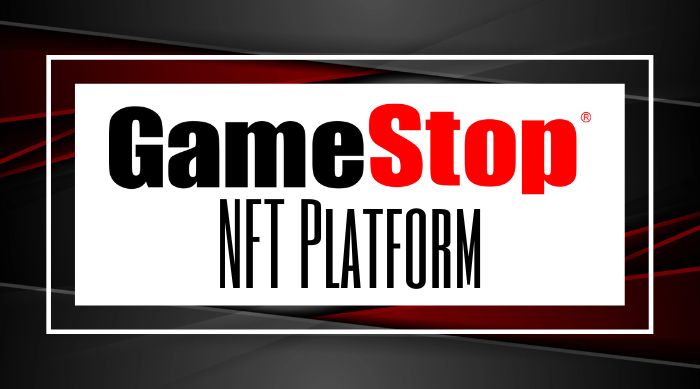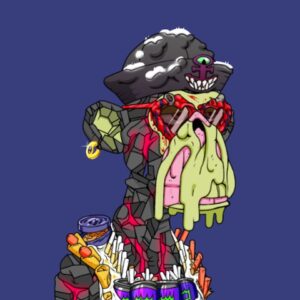GameStop wants your NFTs. The retailer’s official site includes an NFT page which comes on the heels of an earlier announcement of GameStop crypto wallets. That announcement included a tease about a GameStop NFT marketplace, and the NFT page brings that marketplace a step closer to reality.
Leading Up To The GameStop NFT Platform

GameStop had a busy 2022. There was a Robinhood controversy over the company’s stock (which later split) plus employee walkouts over alleged poor working conditions. In February 2022, GameStop announced it would partner with Immutable X to enter the world of blockchain technology.
With hindsight being 20/20, it’s easy to see that GameStop wanted to become a crypto player issuing its own digital wallet ahead of opening a GameStop NFT marketplace and platform. The announcement of the NFT platform was greeted with derision in some sectors; the project seems to have experienced controversy from the moment it was announced.
That may be thanks at least in part due to the timing of that announcement. Some complained the game retailer “chose” to enter the market just as pundits are declaring NFTs as “dead” or in a serious decline.
GameStop and NFTs In A Bear Market
Does it feel a bit hasty to you that some crypto investors are already reading eulogies for NFTs? An NFT bear market was bound to happen at some point, and it’s telling that some investors who are new to the idea might panic when profits start to slide as they are wont to do as part of the investing cycle.
A single market correction or even a series of them is not necessarily an indicator that an investment is doing anything but experiencing a normal part of the cycle of investing. There are highs and lows. GameStop came into the market on one of these lows. What does the platform offer and who should take advantage of it?
Using The GameStop NFT Platform
At press time, when you visit the official GameStop NFT platform, you are encouraged to “Become a Creator” by filling out a form that asks you to identify as an artist, a “Meme Lord”, game developer, or “Other Creator”.
You’re also asked to provide a description of yourself and an NFT project you participated in. For the NFT description, GameStop asks you to upload a file such as a JPG or MP4.
You are also asked for your Ethereum public address. The application process specifies the Ox address only. Adding this address is necessary to be included in the access-allowed list for NFT creators on the platform.
At the end of the “application” creators are asked to link to a portfolio with more work to review and leave comments about the experience if desired. Once that is done, creators are taken back to the main page of the NFT site.
At press time, that is essentially all there is to the process. Filling out the online application is to apply to the Gamestop NFT Marketplace as a “Launch Creator”. If you are accepted, the company sends “an exclusive minting feature” to create NFTs on the GameStop platform.
Should You Become A Launch Creator?
It may be wise to treat the GameStop NFT platform the way you would any other unknown venture by vetting the company, the names involved, and especially the terms of service for the NFT projects you want to create and submit.
For GameStop, the first thing you need to understand about being a Launch Creator is that by using the platform, you give your consent to the terms and services as they are described when you join. Just because you don’t formally say “Yes” in writing to the terms of service, you are obligated to abide by those rules.
That is one of the sticking points for some users–they do not realize that using the service implies agreement with the TOS. Some believe they can skirt these terms by posting an announcement saying they don’t consent to this, that, or the other.
Terms Of Service
When you use the GameStop NFT platform, you have already–by using it–agreed to the TOS based on how the agreement is structured. Don’t kid yourself into thinking otherwise, especially where NFTs are involved. The terms of service are binding in terms of your ability to continue submitting work as an NFT creator, Meme Lord, or Game Dev.
GameStop requires its online users to be 18 or older. GameStop’s TOS warns that you will be liable for both third-party gas fees and GameStop fees when conducting NFT transactions.
GameStop also takes a hands-off approach to third-party services like Ramp and Wyre; if you purchase ETH through these third parties your business is solely with them even when using the GameStop NFT platform.
GameStop cannot cancel or reverse these transactions. They also refuse to be the middleman when it comes to disputes with third party vendors you interact with via the GameStop NFT platform.
All that is fairly standard terms of service boilerplate information, but if you don’t know those rules of engagement before spending any money or time on the site, you may wrongly assume you have recourse or protections where none exist.
You’ll be required as a creator to respect the intellectual property of others; you may or may not be permitted to submit derivative works or fan art as part of an NFT project. Don’t expect to be allowed to violate copyright on the platform even in the gray areas of Fair Use.
There is a lengthy passage in the GameStop TOS about the risk of loss associated with crypto. Not surprisingly GameStop denies any responsibility for your loss of investment funds, real-world money, NFTs, cryptocurrency, or other tokens. You use the platform at your own financial risk and accept this risk by using the service.
Joe Wallace has covered real estate and financial topics, including crypto and NFTs since 1995. His work has appeared on Veteran.com, The Pentagon Channel, ABC and many print and online publications. Joe is a 13-year veteran of the United States Air Force and a former reporter for Air Force Television News.


